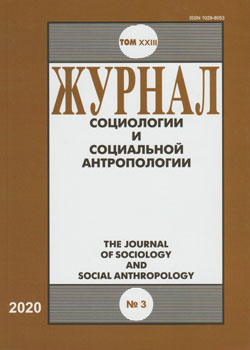Социальная природа награды: исследование по социологии власти
Аннотация
The author focuses on the essence of the award (first of all, state award). The award is understood as a social relation. A distinction is made between a phenomenally given award sign and an award as a positive (incentive) sanction of the authority. The award is considered as a multidimensional symbol. It symbolizes first of all the feats, merits, services, for which it is awarded; social success of the person awarded and social status achieved by him; authority and the legitimacy of the officials. Respectively, the award has three basic forms of the symbolic significance: social-ethical, individual-personal, overbearing-political. The core of the awards essence is a social-hierarchical overbearing-political attitude whose vector is primary always directed from top to bottom. The ideal typical structure of award relations is ternary: the award is a special form of the sustained social interaction between three social actors: (1) the founder of the award and the awarding actor, (2) the actor who receives the conditions for achieving award and deserves it, (3) the society as an observer of the relationship between the first two actors and as a potential participant in the struggle for the awards. The state award systems represent the non-verbal means of communication of authorities and people with the reciprocal contingent selectivity, overbuilt on the natural usual languages. The society's consensus on the value significance of the award is a necessary condition for recognizing the spiritual and moral values contained in the award, which form the foundation of the political ideology prevailing in society, as generally valid. These values determine the choice and character of the social ethical virtues, and they in turn define selective criteria based on which representatives of the ruling authority recognize the actions relevant for the state and society and separate them from the ordinary actions. It also explains why the essence of the award cannot be understood in the light of the doctrine of symbolic exchange. The legitimacy of power domination is a prerequisite for award relations because it creates a moral-willed consensus between their three actors. The social institution of the award affairs operates effectively only due to the legitimacy of power dominance, however, the principle of voluntariness in regard to the conditions for the attaining awards is thereby not violated.
Литература
Averintsev S.S. (2001) Simvol [Symbol]. In: Sofiya — Logos. Slovar' [Sofia — Logos. Dictionary). Kiyev: Dukh i Litera: 155–161 (in Russian).
Bentham J. (1825) The Rationale of Reward. Classical Utilitarism Web Site [http://www.laits.utexas.edu/poltheory/bentham/rr/ ] (accessed: 05.08.2020).
Cassirer E. (2015) Filosofiya simvolicheskikh form. Vol. 1–3. Per. s nem., 2-е izd. [The Philosophy of Symbolic Forms]. Moscow, St. Petersburg: Tsentr gumanitarnykh initsiativ (in Russian).
Luhmann N. (2001) Vlast’[Power]. Moscow: Praksis (in Russian).
Luhmann N. (2005) Real'nost' massmedia [The Reality of Mass Media]. Moscow: Praksis (in Russian).
Malinkin A.N. (2013) Nagrada kak sotsialnyy fenomen. Vvedeniye v sotsiologiyu nagradnogo dela [Award as a Social Phenomenon. The Introduction to a Sociology of Award Affairs]. Moscow; St. Petersburg: Tsentr gumanitarnykh initsiativ (in Russian).
Malinkin A.N. (2018). Kult geroicheskoy lichnosti v nagradakh sotsialisticheskoy Kuby. Issledovaniye po sotsiologii nagradnogo dela. [The Cult of the Heroic Personality in the Awards of Socialist Cuba. Research on the Sociology of Award Affairs]. 2nd ed. Moscow: Russkaja shkola (In Russian).
Malinkin A.N. (2019) Konceptsiya fenomenologii Maksa Schelera. Scheler vs Husserl [The Concept of the Phenomenology by Max Scheler. Scheler vs Husserl] Moscow: Russkaja shkola (In Russian).
Rozanov O.N. (2008) Nagradnyye sistemy v politike i ideologii stran Severo-Vostochnoy Azii [The Award Systems in Politics and Ideology of the Northeast Asian Countries]. Moscow: Pamyatniki istoricheskoy mysli (in Russian).
Scheler M. (2011) Problemy sotsiologii znaniya [Problems of the Sociology of Knowledge]. Moscow: Institut obchegumanitarnyh issledovaniy. (In Russian).
Scheler M. (2020a) Mysli o politike i morali [Thoughts on politics and morality]. Moscow: MSL (in Russian).
Scheler M. (2020b) O sushchnosti filosofii [About the essence of philosophy]. Moscow; St. Petersburg: Tsentr gumanitarnykh initsiativ (in Russian).
Schoeck H. (2010) Zavist. Teoriya sotsialnogo povedeniya [Envy. A Theory of Social Behavior]. Moscow: IRISEN (in Russian).
Sorokin P. (1999) Prestupleniye i kara, podvig i nagrada. Sotsiologicheskiy etyud ob osnovnykh formakh obshchestvennogo povedeniya i morali [Crime and Punishment, Feat and Award. A Sociological Study on the Main Forms of Social Behavior and Morality]. St. Petersburg: RChGI (in Russian).
Toennies F. (2002) Obshchnost i obshchestvo. Osnovnyye ponyatiya chistoy sotsiologii. [Community and Society. Basic Concepts of Pure Sociology]. St. Petersburg: Vladimir Dal' (in Russian).
Weber M. (1985) Wirtschaft und Gesellschaft. Grundriss der verstehenden Soziologie [Economy and Society. An Outline of Interpretive Sociology]. Tübingen: J.C.B. Mohr (Paul Siebeck).

